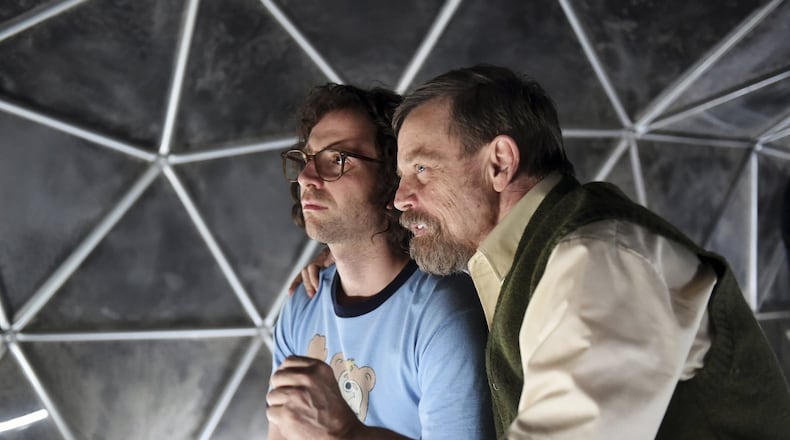Not long after writing and pitching their wildly original, completely incomparable, thoroughly inimitable movie “Brigsby Bear,” “Saturday Night Live” star Kyle Mooney and his collaborator, Dave McCary, heard that — gulp — somebody had already made it.
That is, they got wind of the 2015 documentary “The Wolfpack,” about New York shut-ins whose only knowledge of the outside world came through the TV shows and movies they’d watched.
“You hear the log line (industry jargon for synopsis) and you think, not only has this movie already been made, but it happened in real life, and there’s footage of it!” said McCary.
Not to worry. Their oddball drama goes its own way, though there are things in common — “Brigsby Bear” is the story of a young man named James (Mooney) raised by reclusive, cultish parents. Their self-produced sci-fi kids’ show is the only thing James has ever seen, and watching TV is the only thing he has ever done.
Authorities remove James from the home, but integrating him into society is a problem — he simply can’t conceive of a world that doesn’t revolve around his favorite TV show.
Sound like anyone you know? “Brigsby Bear” has a sneaky relevance — it hits you with perceptive insights into a cosplay culture that years ago crossed a Comi-Con Rubicon into an extended adolescence, abetted and enabled by a movie industry whose biggest creative and monetary investments are in DC and Marvel properties. “Brigsby Bear” grew out of Mooney’s own pop-culture fixations and fanboy perspective.
“I’ve got a pretty big VHS collection, and I spend a lot of time trading found footage of low-budget kids’ shows, and it all started with this idea of this kid obsessed with a TV show that nobody has ever seen,” said Mooney.
He wants to preserve as many of the movie’s twists as possible, but it’s fair to say the narrative ramps up as James’ sensational story becomes national news and clips from the TV show become popular on the internet. (Mooney, who rose to stardom via oddball comedy routines posted on YouTube, has a keen sense of just how plausible this would be.)
“The idea of the show going viral came to us pretty early on,” Mooney said. “If something like this were to become an actual news story, and if it involved clips of a TV show that no one had ever seen, I know for sure I would want to see those clips.”
Mooney, in person, is a transparently genial fellow. You feel that in the way he portrays James and in the way his screenplay treats the character. The story of a naïve recluse let loose in the world, vulnerable to its cynicism and exploitation, is a familiar one, but it’s also one Mooney and company avoid and invert.
“Brigsby Bear” has a generous spirit. So generous that it acknowledges, without resorting to satire, the idea that James is only a slight variation on the modern American man-child (thanks, “Wonder Woman”), indulged by an entertainment industry that feeds viewers versions of the stories they first encountered as kids.
Mooney and McCary are hip to this — they cast Mark Hamill as James’ father — but they are natural optimists who spin James’ arrested development a different way. Fanboys can be isolated, obsessive, passive, but “Brigsby Bear” uses that obsession in a way to connect with other people.
“I think the key thing about James,” McCary said, “is he doesn’t want to consume as much as he wants to create.”
Said Mooney: “We’ve been making music and stuff together since middle school, and then we fell in love with films in our early 20s and started making them, and that was such great fun and a special part of the process of being friends that we knew that’s something we wanted to capture in a story.”
About the Author
Keep Reading
The Latest
Featured


